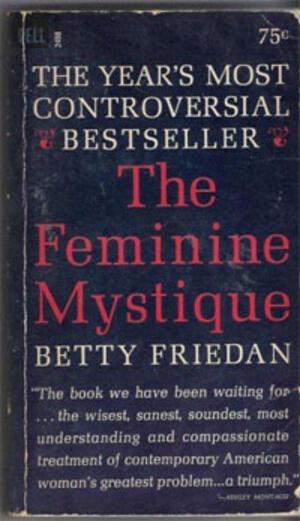Planting the seed: Memories of "The Feminine Mystique"
There’s a lot of buzz these days about Stephanie Coontz’s new book A Strong Stirring, an assessment of Betty Friedans’s 1963 manifesto The Feminine Mystique. It’s stirring up some personal memories of my own.
I was not quite fourteen back in 1964 when an English teacher in our Orthodox day school, a young woman with a sweet sad smile, mentioned a new book that she had recently read. It was called The Feminine Mystique and it seemed this book questioned women’s relegation to domestic roles.
But our teacher didn’t talk about the book so much as the plight of one young woman: She had graduated from an Ivy-league Summa Cum Laude school (back in those days that meant an all-women’s school) and everyone was proud of her achievement. But as soon as the young woman started a family, she was the one pushing the vacuum cleaner and picking up after the kids while her husband went out to make his mark in the world. I remember how I pictured that young woman, looking a lot like this teacher, but all alone in a richly furnished room, searching for stray socks, glancing wistfully at the world through a closed window, her thoughts mutilated by the roar of a machine.
We were students in an Orthodox yeshiva and not accustomed to having the status quo, be it religious or social, seriously questioned. The foundational myth of a traditional Jewish upbringing (and for that matter just about all traditional upbringings) is that men are closer to God while women were created as their helpmates. Men are fashioned in the Divine image whilst we women are derivative, one step further away from the sacred. In my Orthodox family, as in most, my father’s word prevailed while my mother made the masculine will manifest in a myriad of barely-appreciated domestic details.
Withal, there was an unspoken counter-knowledge, a heterodox truth sometimes alluded to in whispers or hinted at behind the mechitza in hushed and persistent laughter. We daughters lived in daily awe of the discrete and direct strength of our mothers, much as we frequently intuited the fragility of our fathers. We understood — but never articulated — that the established order had been imposed to restore to men a power base they did not come by naturally. In my childhood home, as in many others, the intimation of this reversal of assigned attributes had to go underground. It was far too subversive to be spoken, much less explored.
I return to the word “mystique,” made famous by Freidan’s book. Its dictionary definitions include “to bewilder deliberately; play on the credulity of; hoax.” I wonder if our lives were not as much delimited by the masculine mystique as the feminine counterpart.
Hearing about that brilliant young woman who read The Feminine Mystique must have planted a seed. It no longer looked like an honor for my mother when my father, seated at the head of the table, would pronounce the soup she served hot enough for his taste. Ultimately, that new awareness has made it impossible for me to return to an ancient tradition without addressing a pernicious imbalance.
Susan Reimer-Torn is a writer, an executive coach and workshop leader who lives on the Upper West Side of Manhattan and blogs at susanrtorn.wordpress.com.
Betty Friedan's The Feminine Mystique was published 58 years ago today. Learn more at This Week in History.






